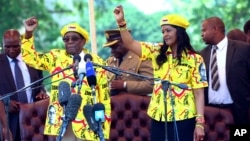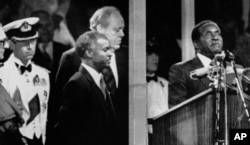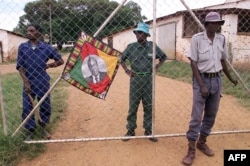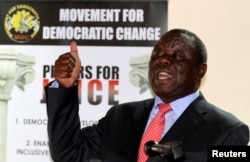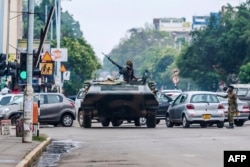1889: Britain's Cecil Rhodes is granted mining rights by King Lobengula of the Ndebele people and he establishes the British South Africa Company with a mandate to colonize the area.
1895: The BSAC adopts the name Rhodesia, in honor of Cecil Rhodes.
1898: The region south of the Zambezi River becomes Southern Rhodesia and while the region to the north becomes Northern Rhodesia (now Zambia).
1922: The white minority in Southern Rhodesia votes to end BSAC rule and becomes a self-governing British colony.
1953: With opposition growing within the black population, Britain creates a Central African Federation consisting of Southern Rhodesia (now Zimbabwe), Northern Rhodesia (now Zambia) and Nyasaland (now Malawi).
1963: Zambia and Malawi gain independence from Britain and exit the federation.
1965: Prime Minister of Rhodesia, Ian Smith, unilaterally declares independence under a white-minority rule, sparking international outrage and United Nations economic sanctions.
1972: Guerrilla war breaks out against the Smith regime. Rival parties Zanu and Zapu orchestrate the fight for black rule from Zambia and Mozambique.
1979: Britain brokers a peace agreement and a constitution for an independent Zimbabwe.
1980: Robert Mugabe and his Zanu party win elections and Mugabe is sworn in as prime minister on April 18. Rival Zapu party leader Joshua Nkomo gets a Cabinet post.
1982: Nkomo is fired and the North-Korea trained Fifth Brigade is sent to crush a Zapu rebellion. Mugabe's forces are accused of killing thousands of civilians.
1987: Mugabe and Nkomo sigh a unity agreement and merge their two parties into Zanu-PF. Mugabe changes the constitution, abolishes the post of prime minister and names himself executive president.
1998-99: An economic crisis marked by high interest rates and inflation leads to strikes and riots. Morgan Tsvangirai emerges as an opposition leader of the Movement for Democratic Change (MDC).
2000: Thousands of squatters, backed by the Mugabe regime, seize white-owned farms in a violent campaign.
2001: Finance Minister Simba Makoni warns of serious food shortages after the World Bank and the IMF cut aid because of the land seizures.
2002: Mugabe defeats Tsvangirai in presidential elections, called flawed and unfair by opposition and international observers.
2003: Tsvangirai is arrested and charged with trying to assassinate Mugabe and seize power.
2004: High court acquits Tsvangirai. The ruling is condemned by the government.
2005: The U.S. labels Zimbabwe one the world's six "outposts of tyranny." ZANU-PF wins parliamentary elections and the majority needed to change the constitution. The U.N. estimates some 700,000 people are made homeless when the government launches a "clean-up" program and destroys shanty towns.
2008: Tsvangirai's MDC claims victory in presidential elections. But the electoral body says he didn't win a simple majority and must face Mugabe in a run-off. Tsvangirai pulls out of the run-off due to alleged intimidation and Mugabe wins the presidency. Tsvangirai and Mugabe sign a power sharing agreement but it stalls.
2009: Tsvangirai is sworn in as prime minister.
2013: Mugabe again wins the presidential elections, rejected as fraudulent by the MDC. Mugabe names Emmerson Mnangagwa vice president.
2014: Mugabe celebrates his 90th birthday. First lady, Grace Mugabe, is made leader of Zanu-PF's Women's League. Vice President Joice Mujuru dismissed from post.
2017: Mugabe fires Mnangagwa, accusing him of disloyalty and plotting to seize power. He flees the country. Top military commander Constantino Chiwenga warns he will "step in" unless Mugabe stops trying to purge ZANU-PF of Mnangagwa supporters. Military takes over the state broadcaster, Zimbabwe Broadcasting Corporation. Mugabe reportedly under house arrest.
